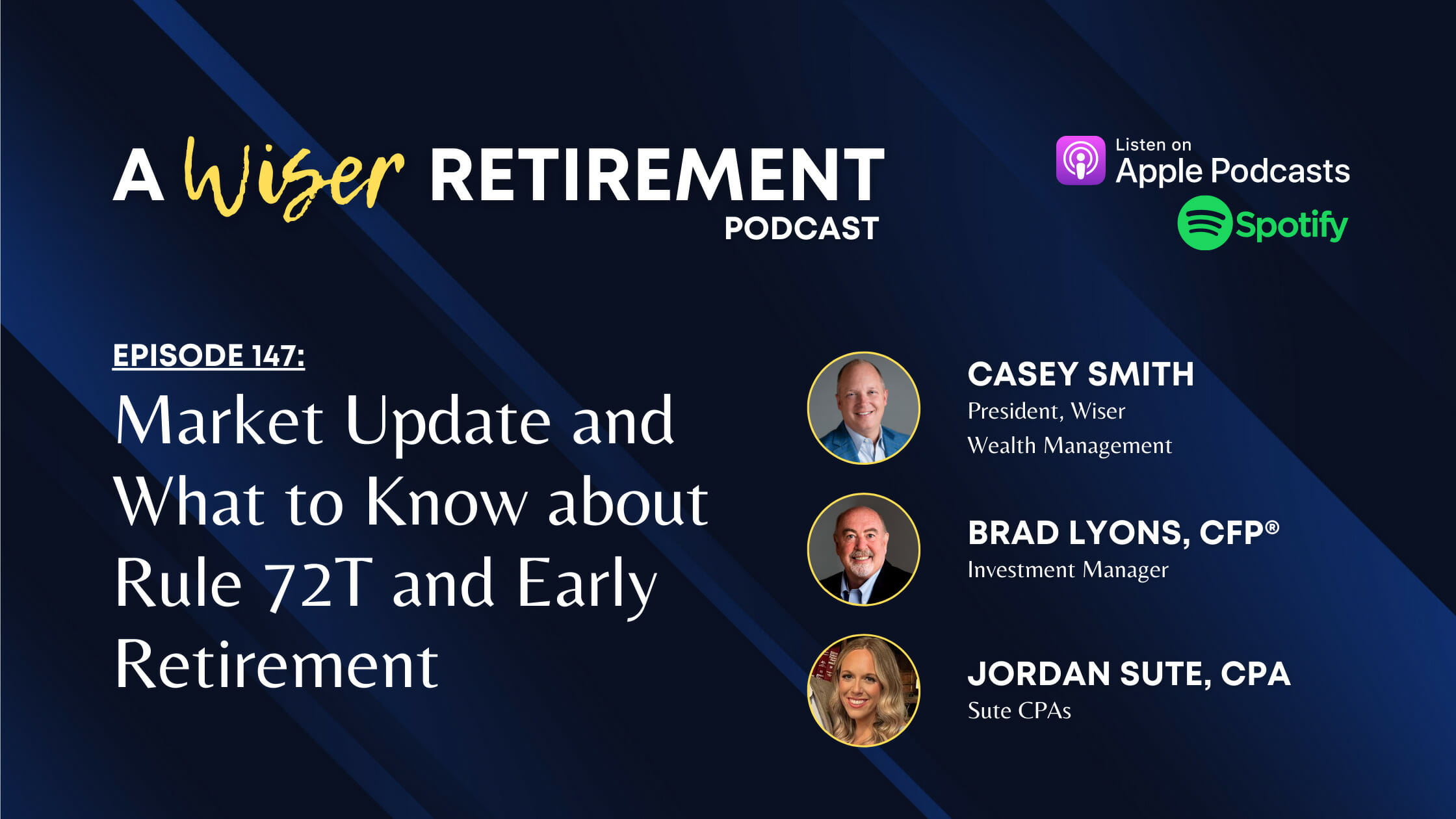
Market Update and What to Know about Rule 72t and Early Retirement
On this episode of A Wiser Retirement Podcast, Casey Smith, Brad Lyons, CFP®, and guest Jordan Sute, CPA, give an update on what’s going on in the market. They also discuss early retirement and rule 72t. They also cover different ways you can avoid tax penalties if you are hoping to retire early.
Listen on Apple Podcasts or watch on YouTube:
SUMMARY:
January 2023 Market Update
Even though the market predictions for 2023 were nothing short of disastrous, January has proved that not all is lost. Historically, 70% of the time, the yearly performance of the stock market follows the January performance. We sure hope that this year especially, this trend will prove itself to be true, allowing for a healthy market recovery. Thus far, we can see that many industries are up, as opposed to expectations from just a couple of months ago.
What is the FIRE Movement?
As we shift topics, we’re also going to talk about the dream of many, early retirement. With the world changing and technology evolving, jobs and people’s mindsets are also changing. The FIRE movement has a lot to do with that. FIRE stands for Financial Independence Retire Early. The idea behind the movement is to save as much as you can in your early career (50%- 70%), and then retire in your mid-thirties or forties. Of course, this is also only possible if you have a high salary early on. Saving 50% to 70% of your salary is not an easy task and is probably not the lifestyle many would choose for themselves. However, people who are able to accomplish this, have a high chance of achieving their goals because it takes a lot of discipline. Discipline is one of the best ways to be intentional about your finances. Even if you are not trying to retire early, there are two major components to the path to financial freedom and success in retirement: eliminate all debt as soon as possible and save as much as you can.
How to Avoid Early Retirement Taxes
You’ve done everything right and now you are ready to retire in your early 50s. How can you start using the money in your IRA without paying penalty taxes? There are a few options, 72(t) in itself is a whole multitude of exceptions. We first need to understand the reason why the money is needed. Some examples include, buying a house, medical expenses, or paying for higher education. These exceptions are covered under 72t and will avoid the 10% tax penalty. However, if the purpose of using the money is to just live off of it and travel before age 59.5, then we get into a very nuance section of the rule, which is called SEPP (Substantial Equal Periodic Payments). It’s a very specific calculation based on different life expectancy and amortization payments. It lines out how much exactly you can take out of your retirement account while avoiding the 10% payment. This can be pretty complex, so it is very important to counsel with a CPA or someone who understands this matter before making a decision on personal payments.
Additionally, it’s important to remember that whatever amount has been calculated for SEPP cannot be changed. So, it is encouraged to avoid going through this channel, if at all possible. Although 72t is an avenue, it probably works better if you have additional funds to fall back on.
Download our eBook on “Top Reasons Most Financial Plans Fail”
TIMESTAMPS:
0:00 Intro
1:00 As Goes January Goes the Year (Or so We Hope)
10:59 FIRE Movement
19:47 How to Avoid Early Retirement Taxes
LINKS:
Learn more about Casey Smith, Brad Lyons, CFP®, and Missie Beach CFP®, CDFA®
CONNECT:
Twitter, Instagram, Facebook, LinkedIn, and YouTube.
Learn more about A Wiser Retirement podcast and access previous episodes.
Share This Story, Choose Your Platform!
Wiser Wealth Management, Inc (“Wiser Wealth”) is a registered investment adviser with the U.S. Securities and Exchange Commission (SEC). As a registered investment adviser, Wiser Wealth and its employees are subject to various rules, filings, and requirements. You can visit the SEC’s website here to obtain further information on our firm or investment adviser’s registration.
Wiser Wealth’s website provides general information regarding our business along with access to additional investment related information, various financial calculators, and external / third party links. Material presented on this website is believed to be from reliable sources and is meant for informational purposes only. Wiser Wealth does not endorse or accept responsibility for the content of any third-party website and is not affiliated with any third-party website or social media page. Wiser Wealth does not expressly or implicitly adopt or endorse any of the expressions, opinions or content posted by third party websites or on social media pages. While Wiser Wealth uses reasonable efforts to obtain information from sources it believes to be reliable, we make no representation that the information or opinions contained in our publications are accurate, reliable, or complete.
To the extent that you utilize any financial calculators or links in our website, you acknowledge and understand that the information provided to you should not be construed as personal investment advice from Wiser Wealth or any of its investment professionals. Advice provided by Wiser Wealth is given only within the context of our contractual agreement with the client. Wiser Wealth does not offer legal, accounting or tax advice. Consult your own attorney, accountant, and other professionals for these services.





